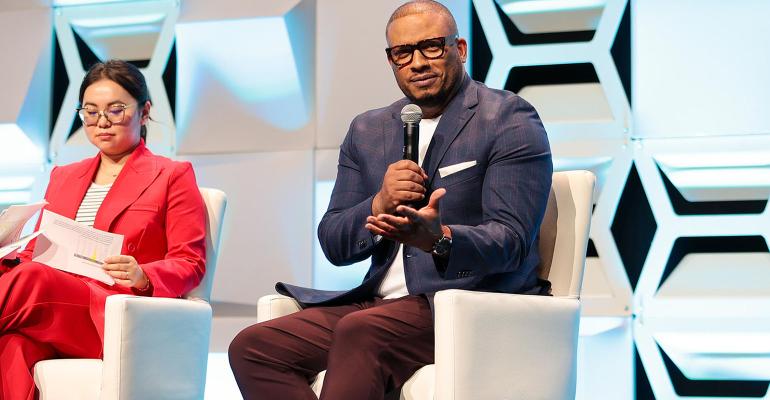Advisors looking to attract millennial clients need to understand that members of that generation are cautious about their financial choices, well-informed and tend to use technology to invest, according to the speakers Tuesday at Inside ETFs+, part of Wealth Management EDGE at The Diplomat Beach Resort in Hollywood Beach, Fla.
Millennials experienced long-lasting trauma from going through the Great Financial Crisis, according to Travis Walker, business solutions and diversity consultant with Allianz. Many lost their jobs and struggled for years to find new employment, while their parents might have lost a significant portion of their savings. That experience left millennials focused more on building a cash buffer to protect themselves from future economic shocks rather than investing their money for future returns. The pandemic and tech valuations crashing in 2022 only compounded those tendencies. Walker told the story of his younger sister, who lost her job with Countrywide Mortgage. In the aftermath, she could barely hold on to the home she had just purchased. Last year, she told Walker she was let go again—this time, from Silicon Valley Bank. But in 2023, she was prepared for the aftershocks because she saved her cash over the past decade.
“If a cat jumps up on a hot stove, it will never jump up on a hot stove again, but it might not jump up on a cold one either,” said Walker, referring to his sister’s cash-hoarding approach. “Now you can talk about if that’s the smartest move, given that she was on the sidelines for much of it and not doing a lot of investing. But when you talk about the behavior and what changed her mindset, she got burnt once in 2008, and by the time 2024 came around, she could send a text saying ‘Lol,’ that she was out of a job.” (Walker’s sister has since hired a financial advisor.)
In addition to the lasting impact of those experiences, millennials often struggle with high student debt, which makes it harder for them to become homeowners, start families, build a nest egg or save money for retirement, noted Liang Zhao, CEO of Vansary, a digital events and marketing agency. That also makes them much more cautious about their investing choices. Zhao cited a survey that found 61% of millennials say financial security is the primary goal for how they approach their savings.
Another attribute that sets millennials apart from their parents is that they are very comfortable using technology to invest. That includes robo advisors, online retail brokerages, AI and cryptocurrency, according to Zhao. “The participation of millennials, as well as Gen Z, is much higher in the digital sphere, as well as on their phones. Let’s talk about mobile interfaces and the ability to access retail investment via the phone. Hello, Robinhood!” she noted.
Zhao cited surveys by the Motley Fool that show, partly due to this tech-savvy, 55% of millennials, a higher share than any other generation, own individual stocks. Forty-seven percent own retirement investment accounts. Forty-three percent—also the highest percentage of any generation—own cryptocurrency. And another 33% own mutual funds.
This is also trickling down to Gen Z, 37% of whom already own stocks and have retirement accounts despite not having a lot of money, noted Zhao.
What does that mean for financial advisors? Don’t treat millennials as “kid idiots” who don’t know what they are talking about, said Walker. “If you are dismissive, you are already in trouble.”
Advisors also need to ensure that their technology is up to date to meet millennials’ high expectations for tech adoption. Walker noted that if you don’t have an online presence, you might as well not exist for those clients. Similarly, you might be turning people away if your website looks dated.
Advisors also have to prove to millennial clients that they bring value to the table, either in the services they receive or in working toward goals that are important to them, such as leaving a positive impact on the environment or using their investments to allow them to travel.
“When it comes to the millennial investor, the goalposts have definitely moved,” said Zhao. What we need to give them looks very different.”





